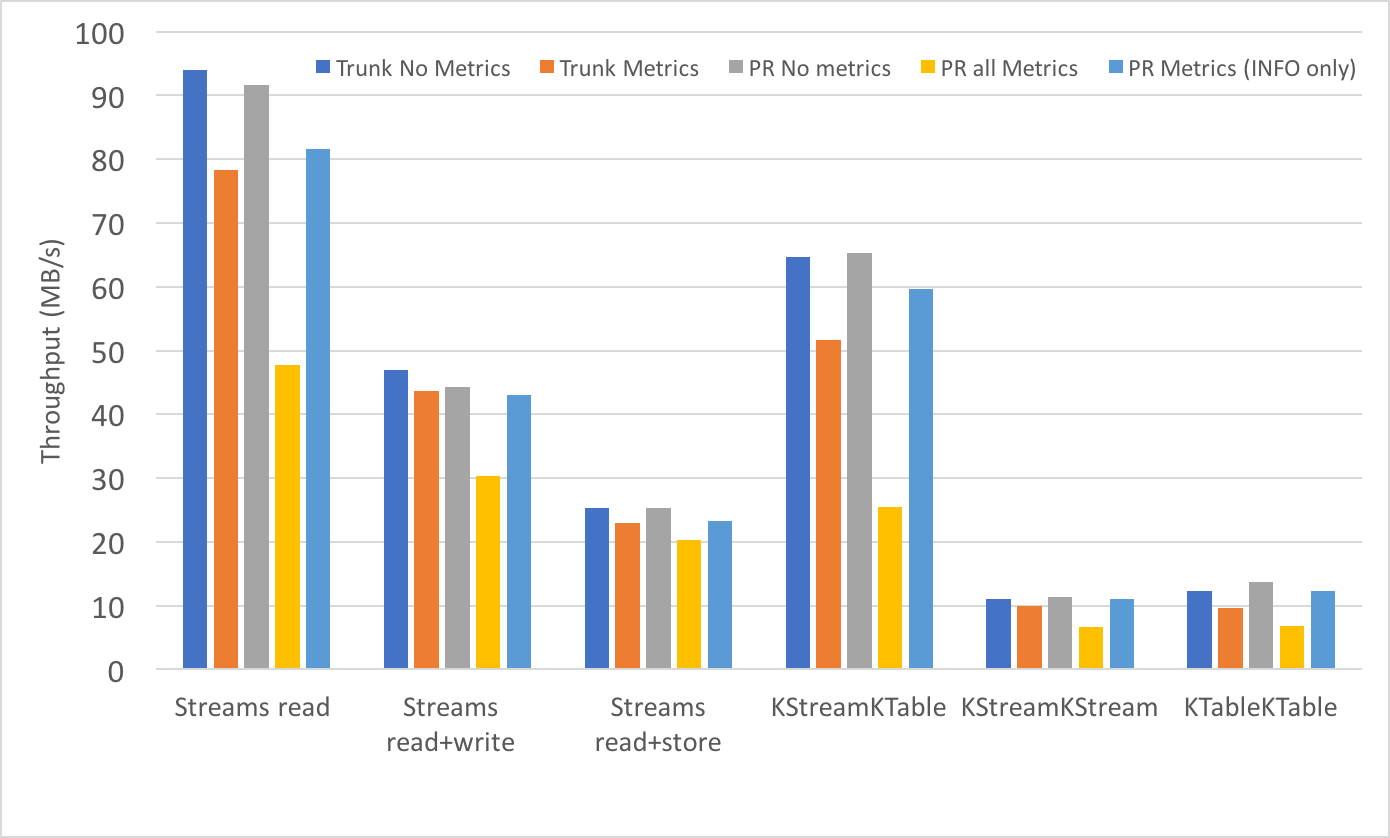Status
Current state: Under Discussion
Discussion thread: here
JIRA: KAFKA-3715 Higher granularity streams metrics
Please keep the discussion on the mailing list rather than commenting on the wiki (wiki discussions get unwieldy fast).
Motivation
- Recording metrics is expensive. There are scenarios where, for debug purposes, tens or hundreds of metrics need to be recorded. The performance impact of always recording can be as high as 50% at times (see graph below showing some Kafka Streams microbenchmarks. This graph is also part of PR for the JIRA for this KIP. Compare the yellow bar which is with all metrics enabled, with any other bar). We would like a way to control which metrics are recorded to address this performance problem.
- This KIP proposes the addition of a RecordLevel in Sensor.java. This associates each sensor with a record level and the metrics and computations associated with the sensor are recorded or calculated only if the metric config of the client requires these metrics to be recorded. For example, a sensor associated with a RecordLevel.DEBUG record level will only record metrics, (and correspondingly compute the time.milliseconds or nanoseconds if required by its metrics), if the client config for metric record levels is set to DEBUG. Note that the sensor will still be registered and polled by any reporters, however the expensive part of updating its metrics will not be done. This provides a mechanism for clients to toggle metric granularity without a change to individual sensors, and we do not perform unnecessary intensive computations associated on metrics which must not be recorded.
- An objective of this KIP is to leave open the possibility of changing the record level at runtime, although it is not in the scope of this KIP to implement that right now.
Public Interfaces
- Changes to public class Sensor.java to include Sensor.RecordLevel
- Addition of static configuration string in CommonClientConfigs.java
- Exposing that configuration string in StreamsConfig.java and KafkaConfig.scala since both use CommonClientConfigs.
Proposed Changes
The constructor of Sensor.java now takes a Sensor.RecordLevel as a parameter. This is an enum which has DEBUG and INFO record levels, and can be extended in future to include other levels.
Sensor(Metrics registry, String name, Sensor[] parents, MetricConfig config, Time time, long inactiveSensorExpirationTimeSeconds, RecordLevel recordLevel)
The ClientConfig will have a new option called 'metrics.record.level' which is set to match the record levels of INFO or DEBUG while defining the consumer config.
- In Sensor.java the shouldRecord() method is used to compare the value of metric record level in the consumer config and the RecordLevel associated with the sensor, to determine if metrics should recorded.
From Sensor.java/**
* @return true if the sensor's record level indicates that the metric will be recorded, false otherwise
*/
public boolean shouldRecord() {
return this.recordLevel.shouldRecord(config.recordLevel());
}From nested enum, Sensor.RecordLevel
public boolean shouldRecord(final RecordLevel configLevel) {
if (configLevel.equals(DEBUG)) {
return true;
} else {
return configLevel.equals(this);
}
} - Further, since both StreamsConfig.java and KafkaConfig.scala use CommonClientConfigs, we also expose that field in both classes respectively.
- Note that any MetricReporter implementations have access to the record level via KafkaMetric.config().recordLevel(). Furthermore, the MetricReporters can retrieve the active config for the record level via the configure method.
Compatibility, Deprecation, and Migration Plan
no migration plan needed, backward compatible constructor for Sensor.java which adds RecordLevel.INFO where a record level is not specified.
Rejected Alternatives
- We considered whether we want to register a DEBUG sensor at all if the config is INFO. Currently we do register it, but we do not record any values. This was rejected because it would add complexity to Sensor.java. A client could attempt to register a metric and report a metric against a sensor which is not internally registered.
- Similarly, we could register a DEBUG sensor if the config is INFO, but have the reporter not poll it. Again this would add some complexity that might not be warranted since the expensive part this KIP tries to address is the management of metrics associated with a sensor.
Future work
- The KIP focuses on one problem only, which is the overhead of computing metrics. It allows for a subsequent JIRA to have a way to change the levels at runtime via JMX. It also allows for a subsequent JIRA to provide more tags to the metrics reporter if desired (e.g., "debug", "info") so that the user has a debug or info dashboard.
